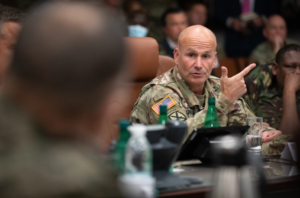The nominee to serve as NATO’s next top military general told lawmakers on Thursday that both Finland and Sweden would bring “quite a bit of capability and capacity” if accepted into the alliance, adding he believes both countries could be integrated quickly.
Army Gen. Christopher Cavoli told the Senate Armed Services Committee during his confirmation hearing that the accession of Finland and Sweden into NATO would have immediate benefits in bolstering deterrence against Russia, citing the importance of their geostrategic locations.

“If we look geographically, with the accession of those two countries the entire Baltic Sea, with the exception of a couple of a few kilometers, will be coastline of NATO nations, which will create a very different geometry in the area,” Cavoli said. “In the most generic sense, it provides a bunch of different dilemmas, almost geometric dilemmas, that Russia does not have right now as they sail forth from St. Petersburg and Kaliningrad. So it will be advantageous [for NATO].”
Cavoli, who currently serves as the commanding general of U.S. Army Europe and Africa, has been nominated to serve in the concurrent role of supreme allied commander of Europe, where he would lead NATO forces, and as commander of U.S. European Command. Cavoli would succeed Air Force Gen. Tod Wolters.
Both Finland and Sweden have formally applied to join NATO this month, and the defensive organization must now unanimously vote to accept the two countries as the 31st and 32nd member nations.
“I think it will be quite easy for us to integrate them quickly. We’ve been integrating them in our large-scale exercises as well as our operations abroad for some years now,” Cavoli said.
Cavoli praised Finland’s large Army as “well equipped, very well trained, very quickly expansable, exercises very frequently and absolutely expert in defending the borderline that it has with Russia,” and noted the nation also possesses fighter jet capabilities, with the country operating a fleet of F-18s, and has a commitment to buy 64 F-35s.
On Sweden, Cavoli noted it has a “smaller Army but a very capable Army,” and said the country’s military has committed to a 200 percent increase in its acquisition budget over a five-year period.
“We work with [Sweden] very closely. Critically, they bring a Navy in the Baltic Sea, which will be of enormous military significance to the alliance,” Cavoli said.
Cavoli was asked whether having Finland’s 800-mile border with Russia would provide new risks to the alliance or offer strategic benefits, responding he viewed it as an advantage that would complicate Russia’s defense planning.
“First of all, Russia has not historically put too many ground forces on that border. It’s been an economy of force theater for them, because they thought they had a relationship with Finland that allowed them to do that. This allowed Russia to concentrate ground forces in other places. That possibility will now go away for Russia. In addition to that, [Finland], as I mentioned a moment ago, are absolutely expert in defending that border,” Cavoli said.
When asked about Turkey’s potential opposition to Finland and Sweden joining NATO, Cavoli declined to discuss specifics on the matter and said the subject had not come up in dialogue with his counterparts in Ankara.
“Clearly, the core of the matter is going to be a diplomatic and policy decision on all nations’ parts, so I’d like to stay away from that for a moment. But, at a military level, we retain robust military relations with our Turkish allies and we have done so for the past years I’ve been associated with working in Europe,” Cavoli said.
A bipartisan group of 82 senators sent a letter to President Biden on Tuesday urging swift consideration of Finland and Sweden’s applications to join NATO.
“Expanding NATO to include Finland and Sweden will send a clear message to Vladimir Putin, and any leader that attempts to follow in his path, that the free world stands ready to defend its values and sovereignty. We will also continue to support NATO’s open-door policy, which affirms that new members are welcome to the alliance,” the senators wrote.